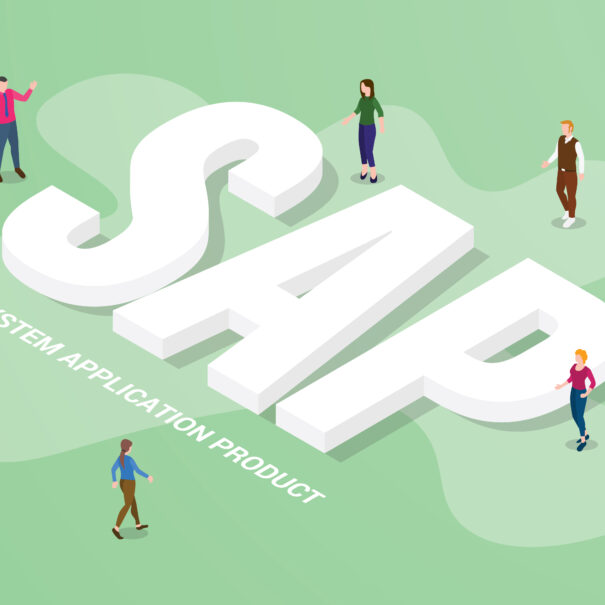SAP Consulting
SAP Consulting
Let us know your business needs and experience the seamless digital transformation with SAP implementation. Our prominent SAP consultants possess the precise expertise required to deliver top-notch SAP consulting services.

What is SAP
SAP stands as a global leader in enterprise software solutions, offering a vast array of products designed to streamline operations and foster business growth. From Enterprise Resource Planning (ERP) and Customer Relationship Management (CRM) to Supply Chain Management (SCM) and Human Resources (HR), SAP’s suite of solutions caters to diverse industries and business needs. At its core, SAP ERP integrates key business functions, like finance, procurement, manufacturing, and sales, into a unified platform, while SAP CRM enhances customer relationship management and sales processes. In tandem, SAP SCM optimizes supply chain operations, and SAP HR manages human resources, including payroll, talent management, and workforce planning. SAP BI empowers organizations to glean insights from data through robust reporting, analytics, and visualization tools, while SAP’s cloud platform, SAP Cloud Platform, facilitates agile application development and deployment. SAP S/4HANA, built on the SAP HANA in-memory database, offers real-time analytics and simplified processes, while SAP Fiori delivers a modern user experience across SAP applications. From small businesses to large enterprises, SAP offers tailored solutions, such as SAP Business One for small and midsize businesses and SAP Leonardo for digital innovation. With a commitment to innovation, quality, and customer success, SAP continues to drive digital transformation and empower businesses to make meaningful impacts worldwide.
Modules of SAP
- SAP ERP (Enterprise Resource Planning):SAP ERP is the core module that integrates various business functions such as finance, sales, procurement, manufacturing, and human resources into a unified platform. It provides real-time visibility into business processes, streamlines operations, and supports decision-making.
- SAP CRM (Customer Relationship Management):SAP CRM helps businesses manage customer relationships and interactions across sales, marketing, and service channels. It enables organizations to enhance customer satisfaction, increase sales effectiveness, and improve marketing campaign performance.
- SAP SCM (Supply Chain Management):SAP SCM optimizes supply chain operations by providing tools for demand planning, supply planning, inventory management, and logistics. It helps businesses reduce costs, improve efficiency, and enhance collaboration with suppliers and partners.
- SAP HR (Human Resources):SAP HR manages human resources processes such as payroll, talent management, performance management, and workforce planning. It helps organizations attract, develop, and retain talent while ensuring compliance with regulatory requirements.
- SAP BI (Business Intelligence):SAP BI enables organizations to turn data into insights through reporting, analytics, and data visualization tools. It helps businesses make informed decisions, identify trends, and monitor key performance indicators across various business functions.
- SAP HCM (Human Capital Management):SAP HCM focuses specifically on managing human capital within an organization, including personnel administration, organizational management, time management, payroll, and benefits administration. It helps businesses optimize workforce management processes and improve employee productivity.
- SAP SRM (Supplier Relationship Management):SAP SRM facilitates collaboration with suppliers and manages the procurement process from sourcing to contract management to supplier performance evaluation. It helps organizations reduce costs, mitigate risks, and improve supplier relationships.
- SAP EWM (Extended Warehouse Management):SAP EWM provides advanced warehouse management capabilities such as inventory management, storage bin management, and warehouse automation. It helps businesses optimize warehouse operations, improve inventory accuracy, and enhance customer service.
- SAP PLM (Product Lifecycle Management):SAP PLM manages the entire lifecycle of a product from ideation to design, manufacturing, and service. It helps businesses innovate faster, reduce time-to-market, and improve product quality and profitability.
- SAP EHS (Environment, Health, and Safety Management):SAP EHS enables organizations to manage environmental, health, and safety risks and compliance requirements. It helps businesses ensure workplace safety, minimize environmental impact, and comply with regulations.
These modules are just a subset of the comprehensive suite of solutions offered by SAP, each addressing specific business needs and processes within an organization.

Our Implementation Plan
- SAP projects begin with a thorough assessment of the organization’s requirements, objectives, and existing systems to determine the scope and goals of the project.
- A project plan is developed outlining key milestones, deliverables, timelines, and resource requirements to guide the implementation process.
- The project team is assembled, comprising consultants, developers, business analysts, and stakeholders, who collaborate closely throughout the project lifecycle.
- Configuration workshops are conducted to map business processes to SAP functionalities, ensuring alignment between system capabilities and organizational needs.
- Customizations and enhancements are developed to address specific business requirements that cannot be met by standard SAP functionality.
- Data migration activities are carried out to transfer data from legacy systems to the SAP environment, ensuring accuracy, completeness, and integrity.
- Extensive testing is conducted to validate the functionality, performance, and reliability of the SAP system, including unit testing, integration testing, and user acceptance testing.
- User training sessions are held to familiarize employees with the SAP system, its features, and its role in supporting their day-to-day tasks and responsibilities.
- A phased approach is often employed for SAP implementations, with gradual rollout of functionalities and modules to minimize disruption to business operations.
- Post-implementation support and maintenance services are provided to address any issues, optimize system performance, and ensure ongoing alignment with evolving business needs.
Why us
Clients should choose us for SAP project implementation because we bring unparalleled expertise and a proven track record of success to the table. With a dedicated team of seasoned consultants, developers, and project managers, we offer comprehensive support throughout every phase of the project lifecycle. Our deep understanding of SAP technologies enables us to tailor solutions that precisely align with each client’s unique business requirements, ensuring maximum value and ROI. We prioritize collaboration and communication, working closely with clients to translate their vision into reality and deliver solutions that drive tangible business outcomes. Our commitment to excellence is reflected in our meticulous attention to detail, rigorous testing methodologies, and unwavering dedication to client satisfaction. We understand the complexities of SAP implementations and proactively anticipate and mitigate risks to ensure smooth project execution. By choosing us, clients can rest assured that their SAP projects will be delivered on time, within budget, and to the highest quality standards. With our proven methodology and innovative approach, we empower clients to unlock the full potential of SAP, streamline operations, and achieve their strategic goals.

What it takes to effectively implement an SAP Project
Executing an SAP project requires a multidisciplinary approach involving various teams with specialized skills and expertise. Here are the different teams typically involved in executing an SAP project:
- Project Management Team:This team oversees the entire project and is responsible for planning, organizing, and coordinating all project activities. Project managers ensure that the project stays on track, within budget, and meets the specified timelines.
- Functional Consultants Team:Functional consultants are experts in specific SAP modules such as Finance (FI), Controlling (CO), Materials Management (MM), Sales and Distribution (SD), and Human Capital Management (HCM). They work closely with business stakeholders to understand their requirements and configure the SAP system to meet those needs.
- Technical Consultants Team:Technical consultants are responsible for the technical aspects of the SAP system, including system architecture, customization, integration, and development. They have expertise in programming languages like ABAP (Advanced Business Application Programming) and are responsible for customizing the SAP system to meet unique business requirements.
- Business Analysts Team:Business analysts bridge the gap between business stakeholders and the technical team. They analyze business processes, gather requirements, document workflows, and ensure that the SAP system aligns with the organization’s objectives.
- Data Migration Team:Data migration specialists are responsible for migrating data from legacy systems to the SAP environment. They ensure that data is cleansed, transformed, and migrated accurately while maintaining data integrity and consistency.
- Testing Team:The testing team is responsible for validating the functionality, performance, and reliability of the SAP system. They conduct various types of testing, including unit testing, integration testing, system testing, and user acceptance testing (UAT), to ensure that the system meets the specified requirements.
- Training Team:The training team is responsible for training end-users on how to use the SAP system effectively. They develop training materials, conduct training sessions, and provide ongoing support to ensure that users are proficient in using the system.
- Change Management Team:Change management specialists help manage the organizational change associated with implementing the SAP system. They communicate with stakeholders, address resistance to change, and ensure that the transition to the new system is smooth and seamless.
- Support Team:The support team provides ongoing support and maintenance for the SAP system after it has been implemented. They troubleshoot issues, address user queries, and ensure that the system continues to function optimally.
- Quality Assurance Team:The quality assurance team ensures that the SAP project meets quality standards and complies with relevant regulations and best practices. They conduct quality reviews, audits, and assessments throughout the project lifecycle to identify and mitigate risks.
By collaborating effectively, these teams ensure the successful execution of SAP projects, delivering solutions that meet business objectives and drive value for the organization.
Why SAP
SAP stands out as a leader in the enterprise software market due to its unmatched combination of breadth, depth, and innovation. With a comprehensive suite of solutions spanning ERP, CRM, SCM, HR, and BI, SAP offers organizations a unified platform to streamline operations, drive growth, and foster digital transformation. SAP’s commitment to continuous innovation, exemplified by its flagship product SAP S/4HANA, enables customers to harness the power of real-time analytics, machine
